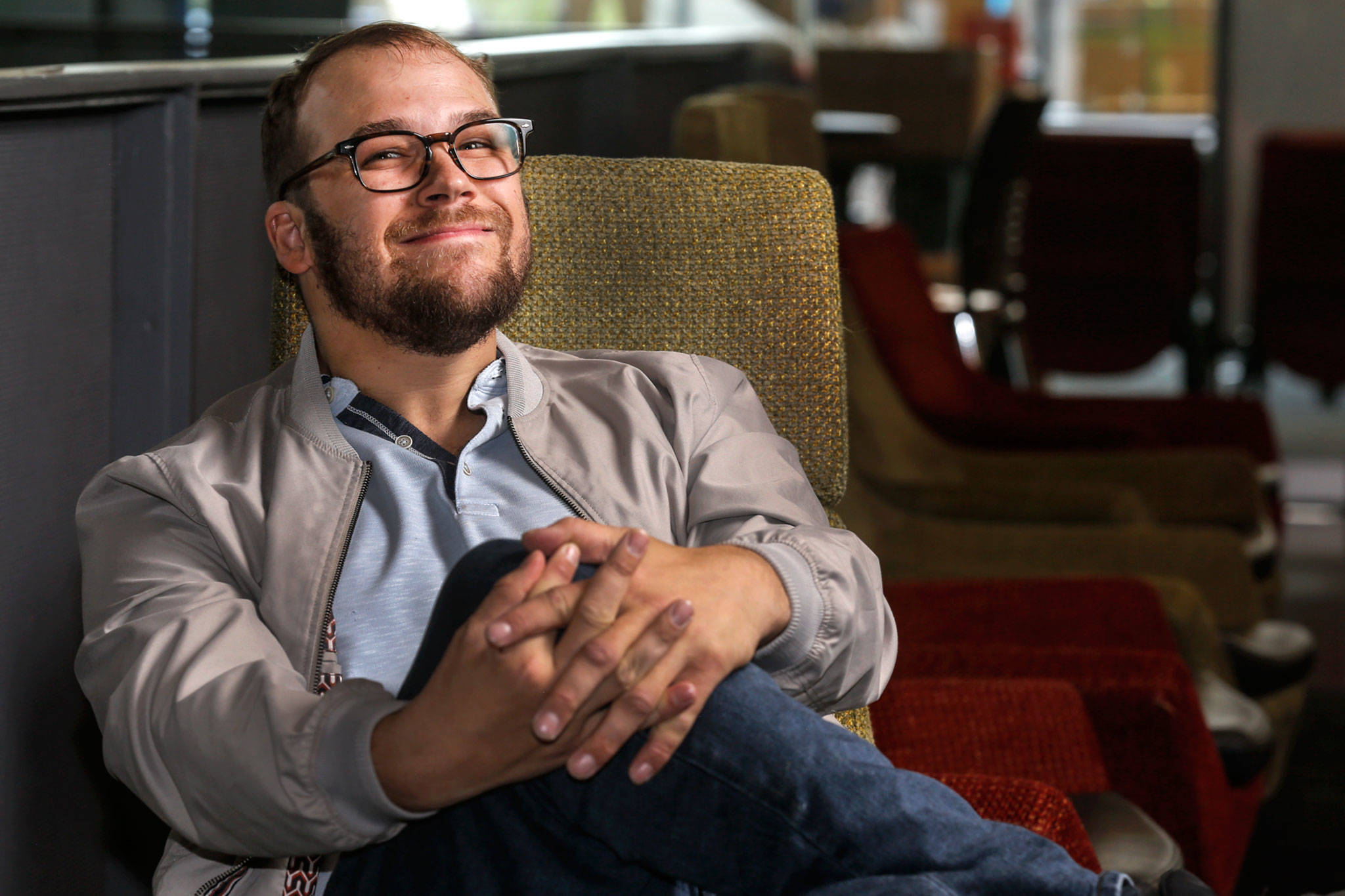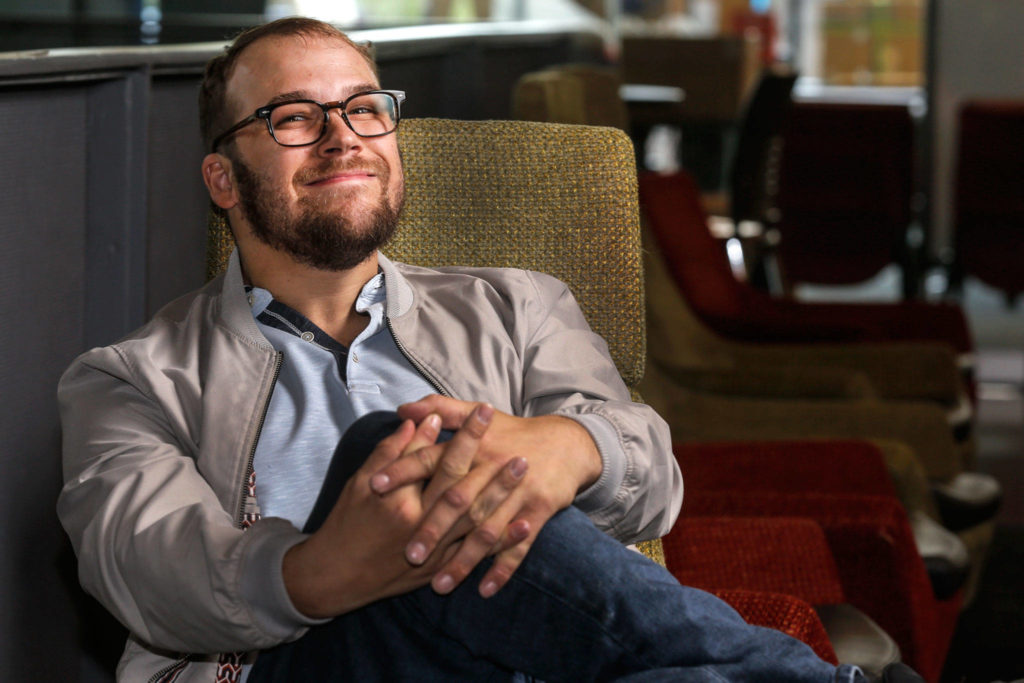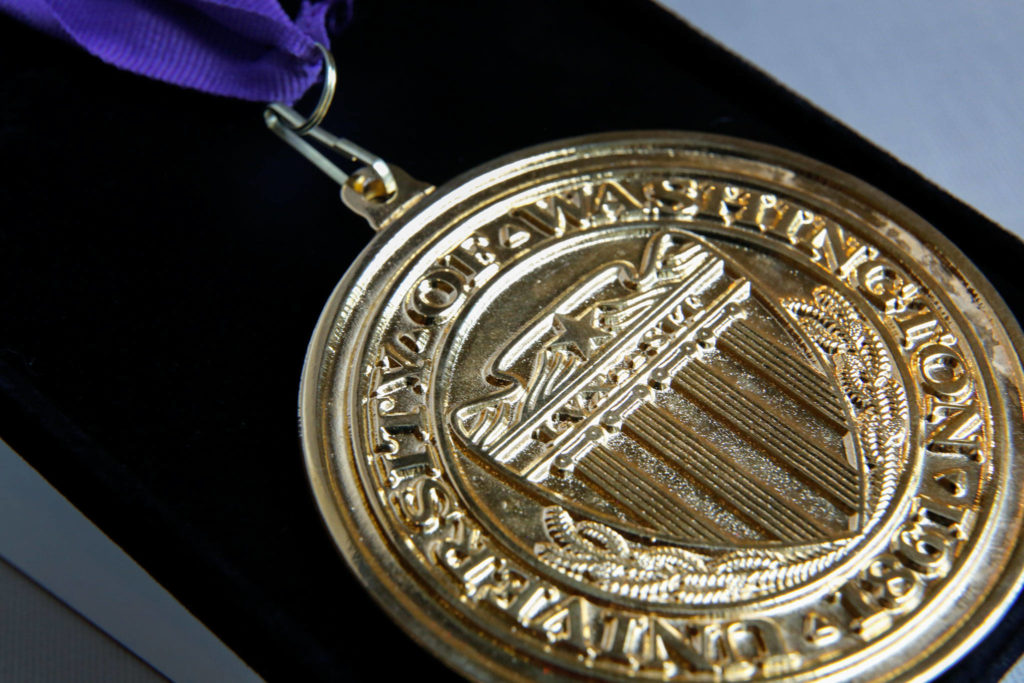As UW Bothell holds its virtual graduation ceremony Sunday, Chris Hays will be honored as the 2021 Chancellor’s Medal recipient. On campus this week, he laced his fingers around his cellphone — one tiny example of how he’s found ways to achieve big success.
“I always had to kind of adapt,” said Hays, whose cerebral palsy has meant overcoming all kinds of barriers.
In the university’s Discovery Hall Wednesday, the 29-year-old Hays demonstrated how he deals with the difficulty of texting. To make it easier, he said, “I interlace my fingers around my phone.”
That’s one of countless strategies Hays said he’s used to successfully navigate school and life.
“What drives me is to show people what is achievable,” he said. “People have doubted me my whole life.”
Hays has more than answered those doubts.
A Law, Economics & Public Policy major who minored in human rights, he’ll graduate cum laude with a 3.88 grade point average, earning his bachelor of arts degree. Law school may be next, or a master’s in public policy, with a long-term goal of changing the world for people with disabilities.
Hays believes the disabled community has been left out of conversations about equity. “I want to raise the voice of the disabled,” he said.
While at UW Bothell, Hays was on the Chancellor’s Advisory Council for Students. He was selected for the university’s Washington, D.C., Human Rights Seminar. An intensive program held virtually this academic year, the seminar was part of his studies in the School of Interdisciplinary Arts & Sciences.
Hays has been a legislative intern, too, working with 5th Legislative District Reps. Lisa Callan and Bill Ramos. And he’s a volunteer with the Seattle-based Outdoors for All Foundation, which provides recreational opportunities for people with disabilities. When he was 15, the nonprofit helped him learn to ski.
He’s also included on the University of Washington’s 2021 Husky 100 list — students recognized for “making the most of their time at the UW.”
“He is a young man that could use so many excuses to not do, to not succeed, to not even try,” wrote Lenina Arenas-Fuentes, chief of staff for UW Bothell’s Office of the Chancellor. In a letter nominating Hays for consideration as this year’s medalist, she wrote that he “reminds me each time we chat that most obstacles come from within. He tries, he does, and he succeeds.”
Cerebral palsy, a group of neurological disorders, is caused by a disruption or abnormality in brain development, most often before birth. Its cause may not be known, but factors can include gene mutations, lack of oxygen to the brain, fetal stroke, maternal or infant infections, or traumatic head injury to an infant.
According to the federal Centers for Disease Control and Prevention, symptoms may include stiff muscles, uncontrollable movements and poor balance and coordination. Someone with severe cerebral palsy might not be able to walk, while a person with milder symptoms may not need special help.
“It’s a range, moderate to extreme. I’m kind of low-moderate,” said Hays, who is affected by muscle spasms.
Hays, who went to Sammamish High School, said he fell in love with education only after leaving Western Washington University, where he started college a decade ago. He said that isolation was a big reason he dropped out.
He was troubled by stigmas and stereotypes, particularly how people with disabilities are viewed by others as “de-sexualized.”
“No one sees you as an intimate being,” said Hays, adding that he felt alone. With a counselor, he talked about past traumas and how those feelings can fuel a loss of self-worth.
“What I’ve learned through therapy, I’m perfect the way I am,” Hays said. “If others don’t accept me, I don’t have time for them.”
Today, Hays lives with his girlfriend, a teacher. They have a golden retriever named Ponyo and love to travel.
The hurts still happen. Before the pandemic, while at a comedy show with his girlfriend, Hays said a group of men called him “the R word,” the offensive term that’s been used to describe a person with an intellectual disability.
More recently, he was kicked out of a store for wearing a mask that didn’t cover his nose. Hays has asthma. The chain store, he said, later sent him an apology, and at his request made a donation to Outdoors for All.
On the UW Bothell campus, Hays has pushed for better access for students with disabilities. Maria Lamarca Anderson, UW Bothell’s communications director, said that through the student advisory council Hays has been in conversations about needs for a residence hall that’s being developed.
Hays also sought changes in parking, an issue on any campus.
“My car always acted as a mobility device,” said Hays, who talked of how he needed to use “all the secret handicapped spaces.” Hays’ perspective helped shape the placement of accessible parking, letting students with disabilities more easily use cars on campus, according to Lamarca Anderson’s profile of the medal winner, which is posted on the UW Bothell website.
Hays described his parents as champions of his education and of “dreaming big.”
“I realize I’m one of the lucky ones, with resources and champions,” he said. Others “sometimes don’t have the resources or accommodations.”
“I want to be a voice for those people, and be that champion,” he said.
Julie Muhlstein: jmuhlstein@heraldnet.com
Talk to us
> Give us your news tips.
> Send us a letter to the editor.
> More Herald contact information.



























